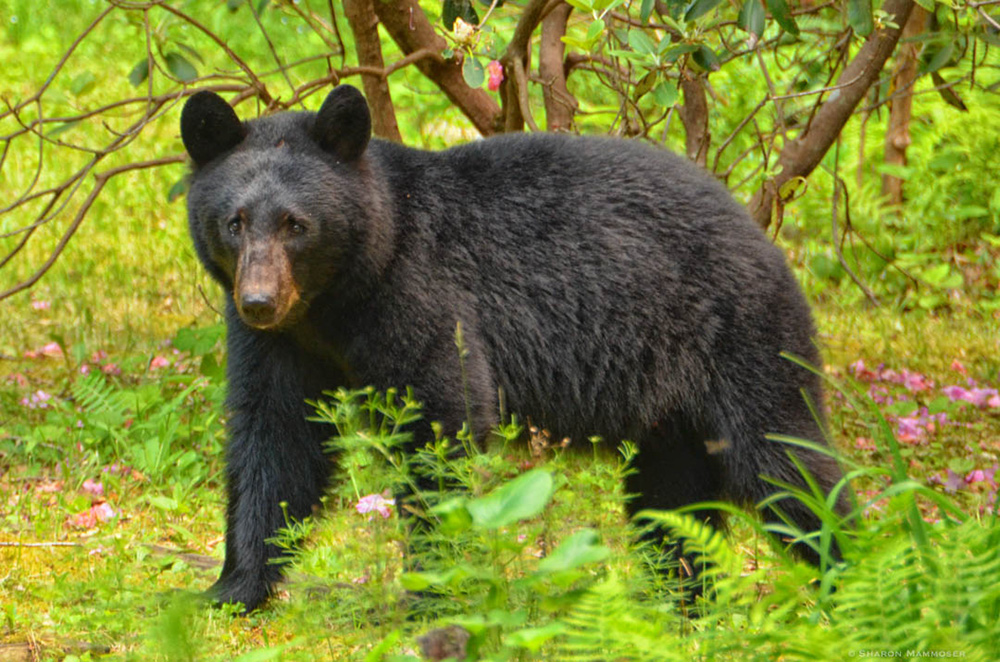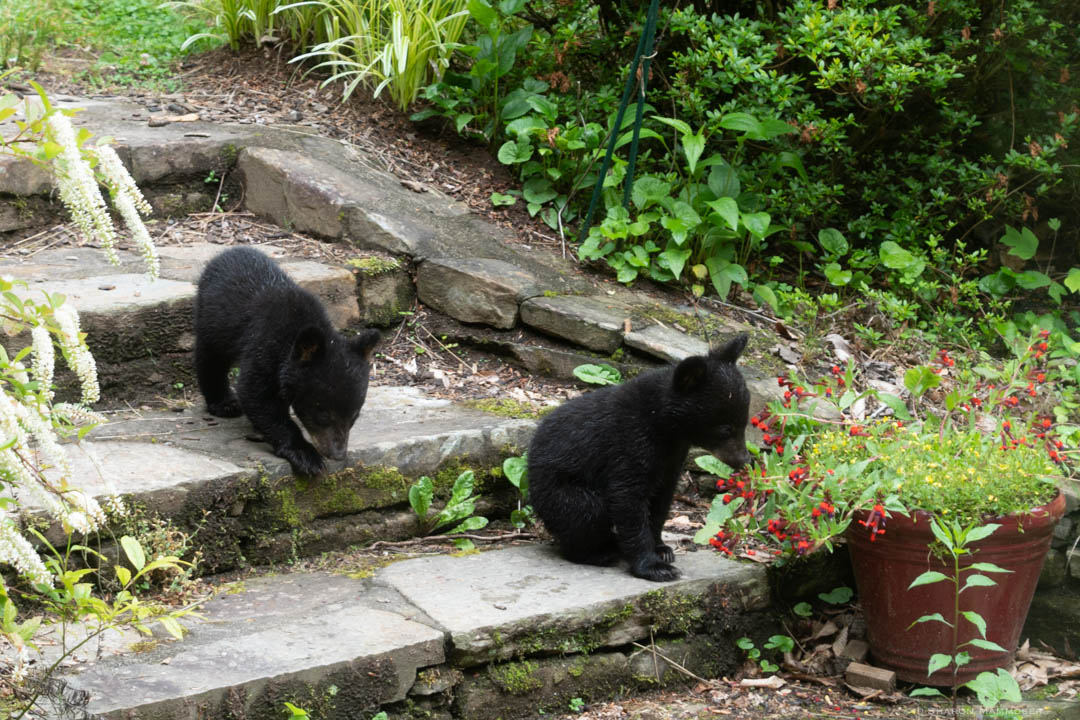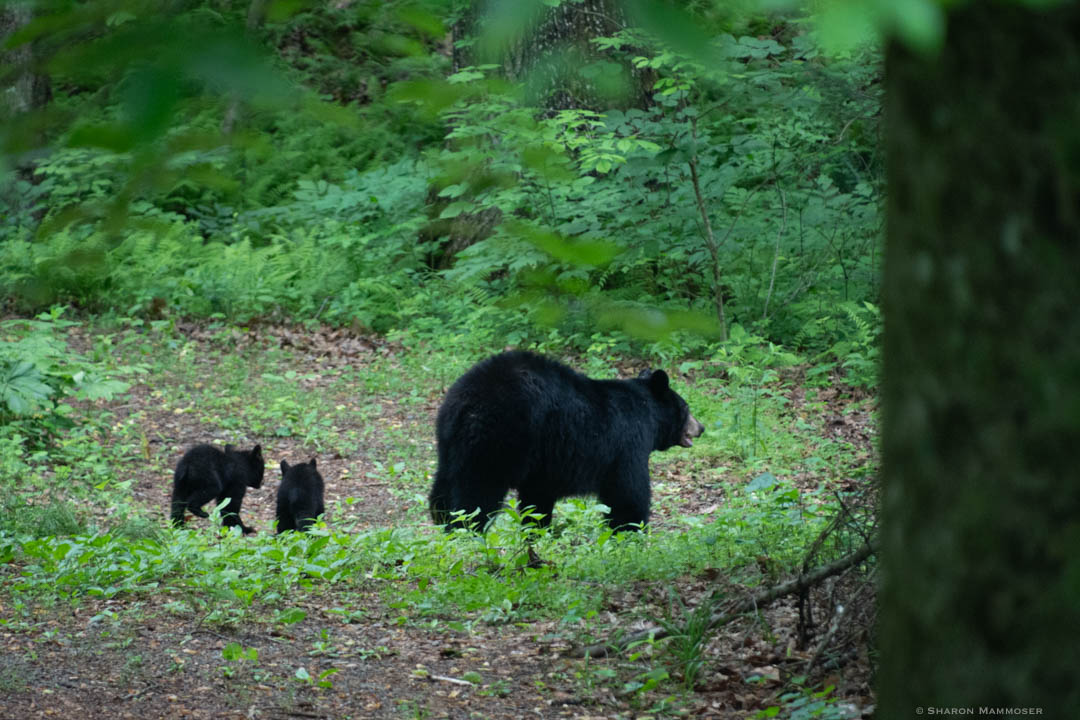Living with Bears: Some Tips to Coexist Peacefully

By Naturalist and Photographer, Sharon Mammoser.
Seeing a bear in the wild for some people is exciting in a good way, while for others, it is terrifying. Since black bears live here and share our outdoor spaces, it makes sense that we learn to coexist with them.
Contrary to popular opinion, 80-90% of a black bear’s diet is plant material, and is highly dependent on the season. They are opportunistic feeders, readily taking advantage of whatever is available. Black bears will eat roots, berries, mushrooms, meat, fish, ants, beetles, caterpillars, and other insects, crayfish, nuts, eggs, larvae, grass, dandelions, and other succulent plants. They’ll also eat small mammals, dead animals, and garbage.
As we cut down more forest and construct more roads, wildlife habitat is shrinking and we are likely to have more bear encounters even though they have a natural fear of humans and tend to avoid us. Our actions can have dire consequences for wildlife. Our actions can also have unwanted and negative consequences for our human neighbors, creating nuisance bears. With some knowledge and good choices, we have the power to keep the wildlife wild and live peacefully with these magnificent animals.

Here’s how you and your pets can stay safe in your yards:
- Never allow pets to roam freely. Cats can become prey to wild animals, and dog and bear encounters don’t usually end well, especially for the dog or the dog’s human. According to Bear Wise, an organization dedicated to helping humans live responsibly with bears “If your dog gets into an encounter with a bear, there’s a fifty percent chance it will be injured or killed. And an even higher chance you’ll be injured if you intervene.” Courtesy of BearWise® | BearWise.org
- If you let your dog out in a fenced area that is too big to see entirely, bang on the window or yell a warning before opening the door for your dog. This allows any wildlife present to make a quick escape and not be surprised by your dog.
- Don’t feed pets outside and never leave food out for stray cats or other animals. You may think leaving food outside is a kind thing to do for outdoor animals, but the reality is that attracting wild mammals to your house can cause problems. Bears and other animals need to stay wild and have a healthy fear of humans. Bears are smart and will learn and remember where to get quick food. They may associate humans with food rewards, returning again for more. Bears may lose their interest in looking for natural food and over time may actually begin approaching people. They may change their habits, causing them to cross roads and risk getting hit by cars. The risk of encounters with your pets and children goes up. Plus human food may cause them to be sick from a diet they don’t have the gut bacteria to handle.
- Make sure your bird feeders are out of reach from bears, or don’t feed the birds at all. While it may seem like an opportunity for a funny video or some close-up photos of bears in action, having bird feeders easily accessible to bears is asking for trouble. Bears are quick to learn where to find food and will return again and again, losing their natural fear of humans.
- Don’t leave your garbage outside, and don’t put it out the night before your scheduled trash pickup. If you leave your full trash can outside, it’s only a matter of time before the bears discover, and raid it. Again, allowing bears to get a food reward in your yard is going to keep them coming back for more and ultimately may result in a “problem” bear that has to be killed when it becomes a nuisance. Your actions can save a bear’s life!
- Don’t approach bears. If a bear or family of bears does come into your yard, enjoy them from a safe distance.
- Clean your outdoor grill as soon as you are done using it. Burn off any food particles and be sure to remove or clean the grease pan regularly.

It’s easy to for everyone to do their part to keep bears wild, for the health and safety of both your human, and your outdoor neighbors.